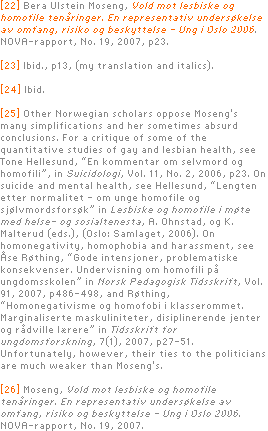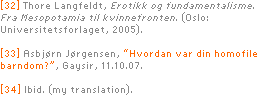| Notable is also the fact that in the latest report on violence against homophile and lesbian youth, she leaves out of account 14.6% of her own informants.[22] Why? Because they did not subscribe to a sexual category when they filled in the questionnaire. Even worse, she does not seem to realise that her own data material is no longer representative. She pompously declares that her report on violence is “the first in Norway and the second in the Nordic countries” to be based on representative data. It is also “the very first in a Nordic and European context to study violence against same-sex sexuals in a comprehensive perspective of health and living conditions”.[23] The latter is obviously not true: the use of an analytic perspective whatsoever is just hinted at in an introductory gesture.[24] Neither the media nor public authorities have read the report with a required minimum of critical attention, and Moseng will be able to advocate the health value of a stable and unpolluted homophile identity based on the statistics she produces.[25] Her project on violence was paid for by The Ministry of Justice and the Police. In the report, published in the autumn of 2007, any other research than large-scale, quantitative, putatively representative surveys is labelled “anecdotic knowledge”.[26] She does, however, need the “anecdotic knowledge” for the little there is of discussion in the report, but does not find it necessary to provide the references to the applied works of other researchers. It is impossible to be absolute in one's reference practice, but to systematically omit mentioning these researchers' names and titles of works is an entirely different matter. Moseng is deputy chair in the health committee of The Association. On October 16, 2007, she was answering questions in a web meeting together with Jon Reidar Øyan, the chair of The Association, and Rolf Angeltvedt, the chair of the association's health committee.[27] The topic was harassment of gays and lesbians, with Moseng's research results as point of departure, and the three of them answered questions coming in from people all over the country. André sent a question about masculinity and homophobia: |  | 

| 
|  |  | Hi! I'm not harassed myself, [...] but I often hear negative comments about more feminine homophiles, so I wonder if sexual harassment of homophiles is supported by “macho culture”, where men are supposed to be “real men”. If so, I think it would be important to fight against such cultures. André [28] The answer given by Bera Moseng is: Hi! There is per today no representative research documenting a correlation between homophobia and macho gender roles. Bera [29] |  | 
| 
|  |  | It might be that what she calls “representative research” is lacking, but I find it hard to believe that she is unaware of the many works of Norwegian colleagues and academics from abroad shedding light on the connection between gendered expectations and the heterosexual norm. Her answer is more than inadequate politically. André is making a very important point.[30] One would wish that the media and the public authorities would begin to relate more also to other forms of research than the works that make up the basis for Moseng's often simplistic and, as we saw here, rather arrogant public statements. |  | 
| 
|  |  | Again and again - in publications with titles such as “Suicidal behaviour among gays and lesbians”, “Suicidal behaviour and sexual orientation”, “The mental health of lesbians”, “Suicidal behaviour among same-sex sexual women and men”, “Gay Pride - a drug survey” and “Violence against lesbians and homophile teenagers” - Moseng establishes and re-establishes the idea of wounded homosexuals in need of great support from society and also as a social minority that is essentially different from the rest of the population.[31] |  | 
| 
|  |  | 
Health issues top the priority list now, as the gender-neutral law of marriage is about to be passed in Parliament. Unfortunately, it seems that the public efforts to stabilise identity and prevent health problems among the homophiles have no age limit - the young homophiles to be protected are these days getting absurdly young. There is hardly any limitation as to how young the homophiles can be before they become the object of preventive efforts from politicians, from researchers, from health workers. Last out is the widely acknowledged psychologist Thore Langfeldt, who, to my knowledge, has not been involved in gay politics directly. He has nevertheless kept an attentive eye on the oppression of homosexuals and been a spokesman for sexual liberation for all.[32] He does not by any definitional means belong to a gay and lesbian elite, but he is part of my analysis because of the ideas he advocates and the way they are circulated in public. Langfeldt is searching for male informants among the gay men visiting Gaysir. Thore Langfeldt's headline reads: How was your homophile childhood?[33] |  | 
| 
|  |  | He needs informants for the production of an educational film about homophile children, a film to be used in kindergartens and primary schools. He is looking for men who can trace their sexual history back to the age of four. It is important, he says, that teachers, parents and not least the homophile children themselves “are aware that a homophile identity develops from the age of four and that it's quite natural”.[34] The film is financed by The Ministry of Health and Care Services via The Norwegian Directorate for Health and Social Affairs (Helsedirektoratet). The Directorate is an administrative body within, and I quote their website, “certain areas in the fields of health and social affairs and have legal authority within this field. The Directorate contributes to the implementation of national health- and social policies, and serves as an advisory body to central authorities, municipalities, regional health authorities and voluntary organisations”. So they are the ones paying for Langfeldt's project. |  | | 
|  |  | This psychologist is particularly interested in masculine homophile boys, since, as he says, research indicates that they amount to a large, but invisible group. “Many of them live difficult lives, and they are not 'disclosed' the same way as feminine, homophile children”.[35] And it is urgent that these boys get the help Langfeldt believes they are in need of, otherwise they are likely to turn into sexual abusers. |  | 
| 
|  |  | 

|  |  |
|